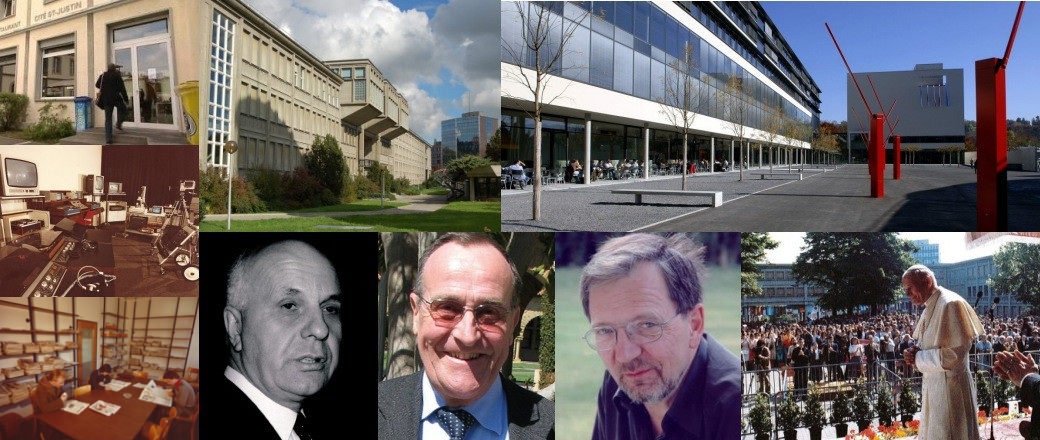
History from 1964 to 2016
1964
Foundation of the Seminar of Journalism on 8 July.
1966
The seminar is recognised as an institute on the basis of the State Council decision of 29 April.
The first director of the Institute is Prof. Dr. Florian Fleck. The first President of the Institute's Board of Trustees is Dr. Max Gressly (until 1976).
The curriculum consists of a four-semester advanced course in journalism, initially with a focus on newspaper studies; students who are registered at the University of Fribourg and have already obtained another degree (licentiate) can complete the course with a diploma. The programme is also open to participants who are not registered and have sufficient previous education; instead of a diploma, they obtain a degree certificate.
1968
In addition to newspaper studies, practical courses in the fields of film, radio and television are offered for the first time.
1978
The Institute moves from Foyer Saint-Justin to Miséricorde university building.
1980
Decision to create a Chair of Journalism and Communication Studies. From the beginning of 1982, Prof. Dr. Louis Bosshart becomes the holder of this chair and at the same time the director of the Institute.
1982
The association "Fribourg Working Group for the Economics of Broadcasting" is founded. Prof. Dr. Florian Fleck is a founding member.
1984
During Pope John Paul II's visit to Switzerland, the Institute of Journalism organises the press centre.
1990
A professorship in "Sociologie de la communication et des médias" in French is created and appointed to Prof. Dr. Jean Widmer.
1998
Media and Communication Studies can be chosen as a major in a Licentiate in Social Sciences. Other branches from the Faculty of Economics and Social Sciences (Sociology, Political Science) and the Faculty of Humanities (Social Work and Social Policy, Ethnology, Religious Studies, Contemporary History) are also involved in the "Department of Social Sciences".
2002
A second professorship in Media and Communication Studies is created (Prof. Dr. Philomen Schönhagen).
2003
Two additional professorships are created in German (Prof. Dr. Joachim Trebbe) and in French (Prof. Dr. Olivier Tschannen).
The professorships in "Media and Communication Studies" and "Sociologie de la communication et des médias" together with the professorships in Sociology (Prof. Dr. Riccardo Lucchini) and Political Science (Prof. Dr. Nicolas Hayoz) now form the Department of Social Sciences of the Faculty of Economics and Social Sciences.
The designation "Institute" disappears. In memory of the two pioneers of 1966, a "Dr. Max Gressly - Prof. Florian Hans Fleck Prize" is established for outstanding work in media and communication studies.
2004
Bachelor programmes are introduced to replace the licentiate degree. The first Master programme, which is based on the Bachelor programme, starts in 2007. A graduation in the old licentiate programme is still possible until 2011.
2005
The department moves into the newly constructed university building Pérolles 2.
Three new female professors take up their work: Prof. Dr. Diana Ingenhoff takes over the fourth German-language professorship in Media and Communication Studies, Prof. Dr. Muriel Surdez a newly created 50% professorship in French, and Prof. Dr. Francesca Poglia Mileti replaces Prof. Dr. Riccardo Lucchini.
2006
Another 50% professorship is created in the French-speaking section (Prof. Dr. Esther Gonzalez Martinez).
2009
Two years after the death of Prof. Dr. Jean Widmer, the remaining professors of the French-speaking section move to the Faculty of Humanities. In the department, which now bears the name "Department of Media and Communication Studies", Prof. Dr Dominique Bourgeois succeeds Jean Widmer as the new professor in "Sciences de la communication et des médias/Journalisme".
2013
Following the departure of Prof. Dr. Joachim Trebbe, who has been replaced in the meantime by Prof. Dr. Michael Schenk, the retirement of Prof. Dr. Louis Bosshart and the creation of a fifth professorship in German-language, three new professors take up their posts: Prof. Dr Andreas Fahr, Prof. Dr Regula Hänggli and Prof. Dr Manuel Puppis.
2014
The department is given the new name "DCM". German: Departement für Kommunikationswissenschaft und Medienforschung. French: Département des sciences de la communication et des médias. English: Department of Communication and Media Research.
2015
Study reform of the DCM programmes in German language: In the Bachelor programme, the major is now offered at 120 ECTS instead of 90 ECTS. The minor programmes at 60 ECTS and 30 ECTS will continue to be offered at the DCM.
On the Master level, a new, modularised study programme with three focal points is introduced: "Media, Politics and the Economy", "Journalism and Organizational Communication", "Media Use and Effects".
2016
Jubilee "50 years of journalism, communication studies and media research in Fribourg/Freiburg".
The Institute of Journalism started in 1966 without its own chair. 50 years later, the DCM has six professorships in "General Communication Studies" (Regula Hänggli), "Systematic and Historical Communication Studies" (Philomen Schönhagen), "Organisational Communication" (Diana Ingenhoff), "Empirical Communication Research" (Andreas Fahr), "Media Systems and Media Structures" (Manuel Puppis) and in "Sciences de la communication et des médias/Journalisme" (Dominique Bourgeois).
